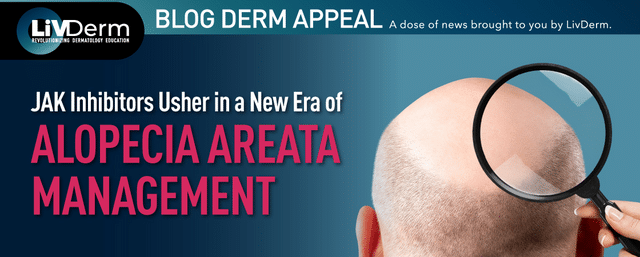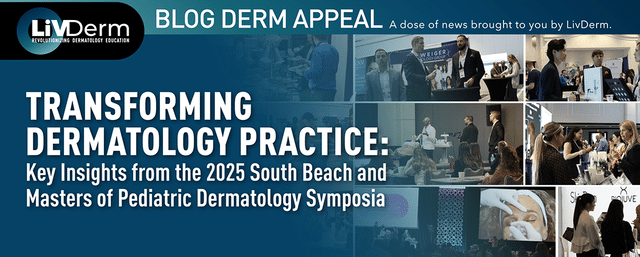The alopecia areata (AA) community received life-changing news last June with the U.S. Food and Drug Administration’s (FDA) first-ever approval of targeted medications for the autoimmune disorder that causes unpredictable hair loss. After decades of treatment challenges, patients now have two new oral Janus kinase (JAK) inhibitor drugs with proven efficacy specifically for alopecia areata treatment. These JAK inhibitors, baricitinib (Olumiant®) and ritlecitinib (LITFULO™) are milestone approvals that offer fresh hope to those coping with this disease.
Understanding the Impacts of AA on Patients
For a condition long misperceived as only cosmetic, the psychological impacts of AA cannot be understated. It can profoundly impact patients’ psychological health and their quality of life. Coping with hair loss can negatively affect self-esteem and body image, and many patients experience social anxiety and depression stemming from feelings of being stigmatized or judged by their appearance. For children and adolescents experiencing hair loss, the effects can severely damage confidence and identity during formative years. Many may be the subject of bullying, further promoting withdrawal from society and deeper depression. Patients stress over the constant need to conceal bald spots and wear wigs. Therefore, it is important to note that beyond being a physical condition, AA brings with it psychological issues and heavy emotional burdens. This is yet another reason why the introduction of these oral JAK inhibitors provides patients with a renewed sense of hope for the future.
JAK Inhibitors: The Breakthrough Treatment for AA
In June 2014, two renowned dermatologists and experts in AA, Brett A. King, MD. PhD, and Brittany G. Craiglow, MD, reported on the first patient with AA to be successfully treated with the JAK inhibitor, tofacitinib. Alongside other experts, these two leading figures have been pivotal in subsequent research, clinical trials, and studies, all of which have led to today’s approvals of these groundbreaking drugs.
Now, with the recent FDA approvals of baricitinib and ritlecitinib, providers have oral medications specifically indicated for AA that have proven efficacy and acceptable safety profiles. Both of these drugs have demonstrated significant hair regrowth for patients experiencing moderate-to-severe AA. What’s more, these treatments come in a convenient pill form, eliminating the need for frequent doctor visits for injections.
Baricitinib
In June 2022, baricitinib was the first drug to be approved for the treatment of severe AA in adults. After two phase 3 trials involving patients with severe AA, oral baricitinib was found to be superior to placebo with respect to hair regrowth at 36 weeks of treatment. Baricitinib was the first drug to be approved for the treatment of severe AA in adults. Investigations are ongoing today in a phase 3 trial which includes children as young as six years through to 18 years.
Ritlecitinib
The later study of ritlecitinib demonstrated similar efficacy, with 23% of patients being treated with the drug showing less than 20% scalp hair loss after six months compared to only 1.6% of placebo. Ritlecitinib is now approved for patients with severe AA as young as 12 years old.
According to Dr. King, the fact that we now have a drug to treat AA in adolescents changes the treatment landscape enormously. Discussing the immense significance of this new treatment for younger patients with AA, Dr. King states,
“Childhood and adolescence are such vulnerable times, and children and adolescents have so much to do and learn and become during these years. It is challenging enough to be a kid, but when alopecia areata happens and suddenly one has big bald spots or is completely bald and missing eyebrows, the normal trajectory of that kid’s life, and the family’s life, too, can be derailed. Kids withdraw from sports and other social activities, and even from school. Extreme sadness and anxiety are common. It is awful. There is a way out of the darkness, however, and that is to regrow the hair that was lost, to restore the person as they had been prior to alopecia areata. Normalcy is so important for everybody, but especially when we are developing. So it is easy to understand what a monumental breakthrough it is to have a medicine, ritlecitinib, approved for adolescents.”
Dr. King
Evaluating JAK Inhibitor Options
Although clinical trials involving JAK inhibitors have centered around patients with 50-100% scalp hair loss, Dr. King and Dr. Craiglow revealed that providers may still consider using JAK inhibitors for treatment even when there is less severe scalp hair loss. Such would be the case “when there is noticeable eyebrows/eyelashes involvement, disease that is refractory to treatment, significant psychosocial impact, and/or diffuse positive hair pull test – or when the current episode of severe hair loss is longer than 10 years.”
Analysis has also demonstrated that two main elements impact the efficacy of JAK inhibitors. The first is the duration of the current episode that a patient has had severe hair loss. Data has shown that treatment provided in the first three to four years of severe scalp hair loss can greatly improve efficacy. The second element to consider is the presence of scalp hair – the more scalp hair a patient has at the start of treatment, the more effective.
Combining JAK Inhibitors with Other Therapies for Enhanced Results
While JAK inhibitors usher in a new era, combination strategies may unlock even better outcomes. Early findings suggest pairing JAK inhibitors with corticosteroids could boost regrowth. According to Dr. King and Dr. Craiglow, oral minoxidil 5 mg twice daily is sometimes effective as monotherapy for AA.
As real-world experience with JAK inhibitors expands, studies combining them with proven treatments and emerging oral therapies could optimize care.
The Future of AA Treatment: Exciting Developments on the Horizon
While the recent approvals of baricitinib and ritlecitinib have made historic strides, innovation in AA therapies continues to move forward. Additional oral JAK inhibitors like deuruxolitinib are progressing through late-stage trials with early research suggesting deuruxolitinib improved hair regrowth for AA versus placebo.
In addition to future FDA approval of deuruxolitinib, Dr. King hopes that ritlecitinib and baricitinib will also be approved for pre-adolescents.
For a condition with no approved treatments just years ago, the pipeline now overflows with technologies that may continue revolutionizing the AA landscape.
Sources:
- https://www.jaad.org/issue/S0190-9622(23)X0002-4
- https://www.nejm.org/doi/full/10.1056/nejmoa2110343
- https://www.yalemedicine.org/news/new-alopecia-areata-treatment-helps-adults-and-adolescents
- https://news.yale.edu/2023/06/26/fda-approves-second-yale-researched-treatment-alopecia-areata
- https://www.jaad.org/article/S0190-9622(23)00988-X/fulltext
- https://www.thelancet.com/journals/lancet/article/PIIS0140-6736%2823%2900222-2/fulltext

















